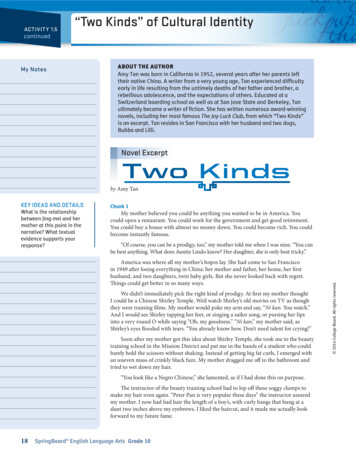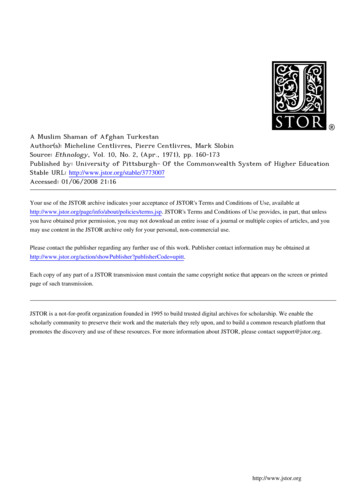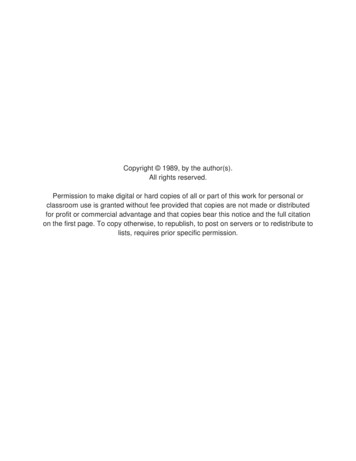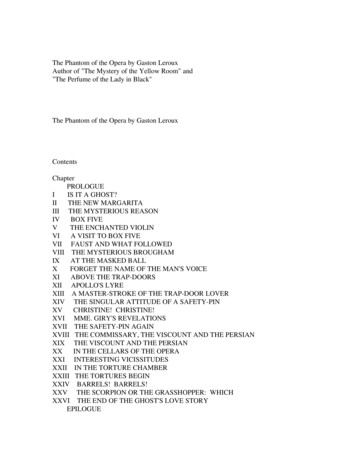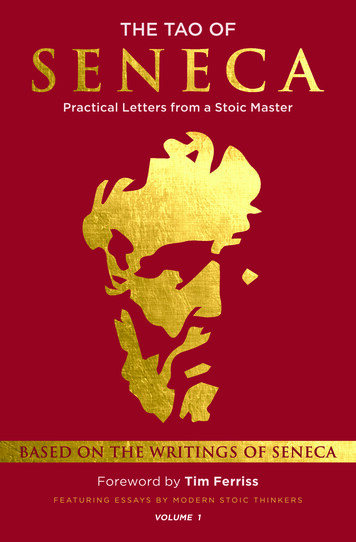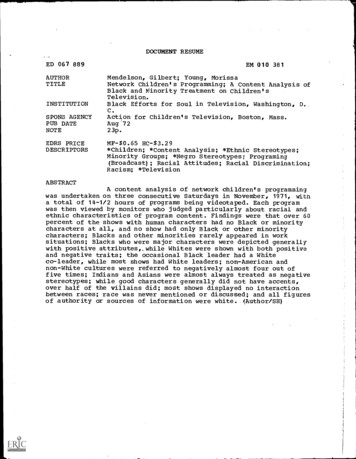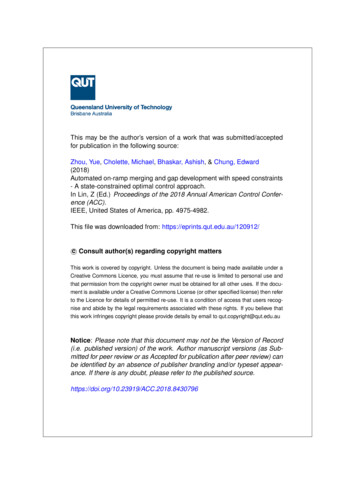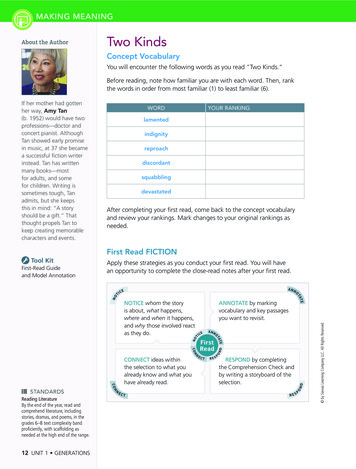
Transcription
MAKING MEANINGAbout the AuthorTwo KindsConcept VocabularyYou will encounter the following words as you read “Two Kinds.”Before reading, note how familiar you are with each word. Then, rankthe words in order from most familiar (1) to least familiar (6).If her mother had gottenher way, Amy Tan(b. 1952) would have twoprofessions—doctor andconcert pianist. AlthoughTan showed early promisein music, at 37 she becamea successful fiction writerinstead. Tan has writtenmany books—mostfor adults, and somefor children. Writing issometimes tough, Tanadmits, but she keepsthis in mind: “A storyshould be a gift.” Thatthought propels Tan tokeep creating memorablecharacters and events.WORDYOUR ngdevastatedAfter completing your first read, come back to the concept vocabularyand review your rankings. Mark changes to your original rankings asneeded.First Read FICTIONFirst-Read Guideand Model Annotation STANDARDSReading LiteratureBy the end of the year, read andcomprehend literature, includingstories, dramas, and poems, in thegrades 6–8 text complexity bandproficiently, with scaffolding asneeded at the high end of the range.12 UNIT 1 GENERATIONSApply these strategies as you conduct your first read. You will havean opportunity to complete the close-read notes after your first read.NOTICE whom the storyis about, what happens,where and when it happens,and why those involved reactas they do.ANNOTATE by markingvocabulary and key passagesyou want to revisit.CONNECT ideas withinthe selection to what youalready know and what youhave already read.RESPOND by completingthe Comprehension Check andby writing a storyboard of theselection. by Savvas Learning Company LLC. All Rights Reserved.Tool Kit
ANCHOR TEXT NOVEL EXCERPT Two KindsfromThe Joy Luck ClubAmy TanBACKGROUNDIn 1949, following years of civil war, the Communist Party seized controlof China. A number of Chinese who feared Communists—like themother in “Two Kinds”—fled to the United States. Many lost everythingexcept their hopes for a better future. They placed these hopes on theshoulders of their children born in the new land. by Savvas Learning Company LLC. All Rights Reserved.123My mother believed you could be anything you wanted to bein America. You could open a restaurant. You could workfor the government and get good retirement. You could buy ahouse with almost no money down. You could become rich. Youcould become instantly famous.“Of course, you can be prodigy,1 too,” my mother told me whenI was nine. “You can be best anything. What does Auntie Lindoknow? Her daughter, she is only best tricky.”America was where all my mother’s hopes lay. She had comehere in 1949 after losing everything in China: her mother andfather, her family home, her first husband, and two daughters,twin baby girls. But she never looked back with regret. There wereso many ways for things to get better.**SCAN FORMULTIMEDIANOTES*1. prodigy (PROD uh jee) n. child of unusually high talent.Two Kinds 13
CLOSE READANNOTATE: Markthe italicized words inparagraphs 4 and 5.QUESTION: What isdifferent or unusual aboutthese words?CONCLUDE: What effect56is created by the author’suse of these words?lamented (luh MEHNT ihd) v.expressed regret789indignity (ihn DIHG nuh tee) n.feeling that one has beendisrespectedreproach (rih PROHCH) n.criticism or disapproval1011We didn’t immediately pick the right kind of prodigy. At firstmy mother thought I could be a Chinese Shirley Temple.2 We’dwatch Shirley’s old movies on TV as though they were trainingfilms. My mother would poke my arm and say, “Ni kan”—Youwatch. And I would see Shirley tapping her feet, or singing asailor song, or pursing her lips into a very round O while saying,“Oh my goodness.”“Ni kan,” said my mother as Shirley’s eyes flooded with tears.“You already know how. Don’t need talent for crying!”Soon after my mother got this idea about Shirley Temple, shetook me to a beauty training school in the Mission district and putme in the hands of a student who could barely hold the scissorswithout shaking. Instead of getting big fat curls, I emerged withan uneven mass of crinkly black fuzz. My mother dragged me offto the bathroom and tried to wet down my hair.“You look like Negro Chinese,” she lamented, as if I had donethis on purpose.The instructor of the beauty training school had to lop off thesesoggy clumps to make my hair even again. “Peter Pan is verypopular these days,” the instructor assured my mother. I now hadhair the length of a boy’s, with straight-across bangs that hung ata slant two inches above my eyebrows. I liked the haircut and itmade me actually look forward to my future fame.In fact, in the beginning, I was just as excited as my mother,maybe even more so. I pictured this prodigy part of me as manydifferent images, trying each one on for size. I was a daintyballerina girl standing by the curtains, waiting to hear the rightmusic that would send me floating on my tiptoes. I was likethe Christ child lifted out of the straw manger, crying with holyindignity. I was Cinderella stepping from her pumpkin carriagewith sparkly cartoon music filling the air.In all of my imaginings, I was filled with a sense that I would soonbecome perfect. My mother and father would adore me. I would bebeyond reproach. I would never feel the need to sulk for anything.But sometimes the prodigy in me became impatient. “If youdon’t hurry up and get me out of here, I’m disappearing forgood,” it warned. “And then you’ll always be nothing.”*12**Every night after dinner, my mother and I would sit at theFormica kitchen table. She would present new tests, taking herexamples from stories of amazing children that she read in Ripley’sBelieve It or Not, or Good Housekeeping, Reader’s Digest, and a dozen2. Shirley Temple American child star of the 1930s. She starred in her first movie at agethree and won an Academy Award at age six.14 UNIT 1 GENERATIONS by Savvas Learning Company LLC. All Rights Reserved.4NOTES
131415161718 by Savvas Learning Company LLC. All Rights Reserved.1920other magazines she kept in a pile in our bathroom. My mothergot these magazines from people whose houses she cleaned.And since she cleaned many houses each week, we had a greatassortment. She would look through them all, searching for storiesabout remarkable children.The first night she brought out a story about a three-year-oldboy who knew the capitals of all the states and even most of theEuropean countries. A teacher was quoted as saying the little boycould also pronounce the names of the foreign cities correctly.“What’s the capital of Finland?” My mother asked me, lookingat the magazine story.All I knew was the capital of California, because Sacramentowas the name of the street we lived on in Chinatown. “Nairobi!”I guessed, saying the most foreign word I could think of. Shechecked to see if that was possibly one way to pronounce“Helsinki” before showing me the answer.The tests got harder—multiplying numbers in my head, findingthe queen of hearts in a deck of cards, trying to stand on my headwithout using my hands, predicting the daily temperatures in LosAngeles, New York, and London.One night I had to look at a page from the Bible for threeminutes and then report everything I could remember. “NowJehoshaphat had riches and honor in abundance and . . . that’s all Iremember, Ma,” I said.And after seeing my mother’s disappointed face once again,something inside of me began to die. I hated the tests, the raisedhopes and failed expectations. Before going to bed that night, Ilooked in the mirror above the bathroom sink and when I sawonly my face staring back—and that it would always be thisordinary face—I began to cry. Such a sad, ugly girl! I made highpitched noises like a crazed animal, trying to scratch out the facein the mirror.And then I saw what seemed to be the prodigy side ofme—because I had never seen that face before. I looked at myreflection, blinking so I could see more clearly. The girl staringback at me was angry, powerful. This girl and I were the same. Ihad new thoughts, willful thoughts, or rather thoughts filled withlots of won’ts. I won’t let her change me, I promised myself. Iwon’t be what I’m not.So now on nights when my mother presented her tests, Iperformed listlessly, my head propped on one arm. I pretended tobe bored. And I was. I got so bored I started counting the bellowsof the foghorns out on the bay while my mother drilled me inother areas. The sound was comforting and reminded me of thecow jumping over the moon. And the next day, I played a gamewith myself, seeing if my mother would give up on me beforeNOTESCLOSE READANNOTATE: Mark wordsor phrases in paragraphs18 and 19 that reveal thenarrator’s feelings.QUESTION: Why mightthe author have chosento reveal the contrastingemotions of the narrator?CONCLUDE: What effectdoes this choice have onthe reader?Two Kinds 15
21222324eight bellows. After a while I usually counted only one, maybetwo bellows at most. At last she was beginning to give up hope.Two or three months had gone by without any mention ofmy being a prodigy again. And then one day my mother waswatching The Ed Sullivan Show3 on TV. The TV was old and thesound kept shorting out. Every time my mother got halfway upfrom the sofa to adjust the set, the sound would go back on andEd would be talking. As soon as she sat down, Ed would go silentagain. She got up, the TV broke into loud piano music. She satdown. Silence. Up and down, back and forth, quiet and loud. Itwas like a stiff embraceless dance between her and the TV set.Finally, she stood by the set with her hand on the sound dial.She seemed entranced by the music, a little frenzied piano piecewith this mesmerizing quality, sort of quick passages and thenteasing lilting ones before it returned to the quick playful parts.“Ni kan,” my mother said, calling me over with hurried handgestures. “Look here.”I could see why my mother was fascinated by the music. It wasbeing pounded out by a little Chinese girl, about nine years old,with a Peter Pan haircut. The girl had the sauciness of a ShirleyTemple. She was proudly modest like a proper Chinese child. And3. The Ed Sullivan Show popular television variety show that ran from 1948 to 1971.16 UNIT 1 GENERATIONS by Savvas Learning Company LLC. All Rights Reserved.NOTES
2526272829303132 by Savvas Learning Company LLC. All Rights Reserved.33343536she also did this fancy sweep of a curtsy, so that the fluffy skirtof her white dress cascaded slowly to the floor like the petals of alarge carnation.In spite of these warning signs, I wasn’t worried. Our familyhad no piano and we couldn’t afford to buy one, let alone reamsof sheet music and piano lessons. So I could be generous in mycomments when my mother bad-mouthed the little girl on TV.“Play note right, but doesn’t sound good! No singing sound,”complained my mother.“What are you picking on her for?” I said carelessly. “She’spretty good. Maybe she’s not the best, but she’s trying hard.” Iknew almost immediately that I would be sorry I said that.“Just like you,” she said. “Not the best. Because you not trying.”She gave a little huff as she let go of the sound dial and sat downon the sofa.The little Chinese girl sat down also to play an encore of“Anitra’s Dance” by Grieg.4 I remember the song, because later onI had to learn how to play it.Three days after watching The Ed Sullivan Show, my mothertold me what my schedule would be for piano lessons and pianopractice. She had talked to Mr. Chong, who lived on the first floorof our apartment building. Mr. Chong was a retired piano teacherand my mother had traded housecleaning services for weeklylessons and a piano for me to practice on every day, two hours aday, from four until six.When my mother told me this, I felt as though I had been sentto hell. I whined and then kicked my foot a little when I couldn’tstand it anymore.“Why don’t you like me the way I am? I’m not a genius! I can’tplay the piano. And even if I could, I wouldn’t go on TV if youpaid me a million dollars!” I cried.My mother slapped me. “Who ask you be genius?” she shouted.“Only ask you be your best. For you sake. You think I want you begenius? Hnnh! What for! Who ask you!”“So ungrateful,” I heard her mutter in Chinese, “If she had asmuch talent as she has temper, she would be famous now.”Mr. Chong, whom I secretly nicknamed Old Chong, was verystrange, always tapping his fingers to the silent music of aninvisible orchestra. He looked ancient in my eyes. He had lostmost of the hair on top of his head and he wore thick glasses andhad eyes that always looked tired and sleepy. But he must havebeen younger than I thought, since he lived with his mother andwas not yet married.I met Old Lady Chong once and that was enough. She had thispeculiar smell like a baby that had done something in its pants.NOTESCLOSE READANNOTATE: Mark thepunctuation in paragraphs32 and 33 that revealshow the mother anddaughter communicate.QUESTION: What doesthe punctuation suggestabout the tone of theconversation?CONCLUDE: How doesthe punctuation in theseparagraphs help you tobetter understand theconflict between themother and the daughter?4. Grieg (greeg) Edvard Grieg (1843–1907), Norwegian composer.Two Kinds 17
37383940414243discordant (dihs KAWRD uhnt)adj. lacking harmony44And her fingers felt like a dead person’s, like an old peach I oncefound in the back of the refrigerator; the skin just slid off the meatwhen I picked it up.I soon found out why Old Chong had retired from teachingpiano. He was deaf. “Like Beethoven!”5 he shouted to me. “We’reboth listening only in our head!” And he would start to conducthis frantic silent sonatas.Our lessons went like this. He would open the book andpoint to different things, explaining their purpose: “Key! Treble!Bass! No sharps or flats! So this is C major! Listen now and playafter me!”And then he would play the C scale a few times, a simple chord,and then, as if inspire
her way, Amy Tan (b. 1952) would have two professions—doctor and concert pianist. Although Tan showed early promise in music, at 37 she became a successful fiction writer instead. Tan has written many books—most for adults, and some for children. Writing is sometimes tough, Tan admits, but she keeps this in mind: “A story should be a gift.” That
